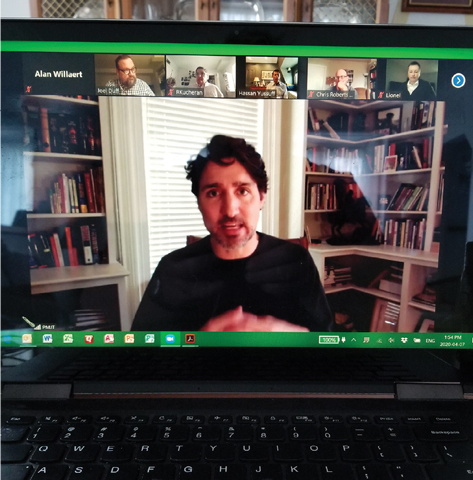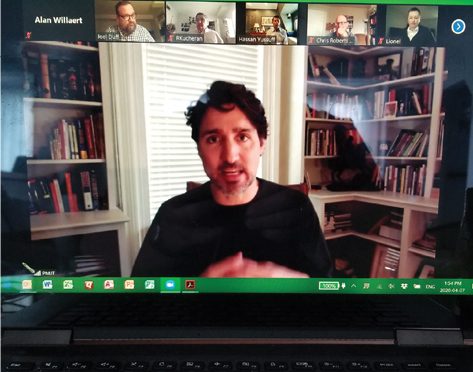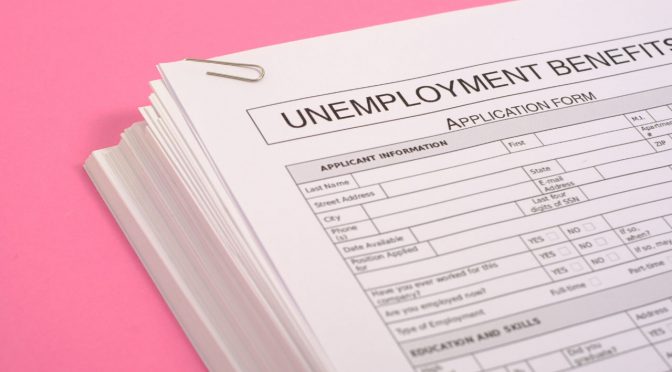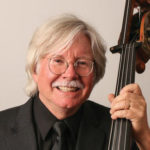Pour voir cet article en français, cliquez ici.
In 1927, a movie called The Jazz Singer was released. As the first “talkie,” it sounded the death knell for live music work in theatres throughout North America. The phasing out of radio orchestras resulted in a large number of musicians being unemployed. However, 2020 will be infamous in history as a virus now identified as COVID-19 effectively shut down an entire entertainment industry in an extremely sudden and devastating manner. This is not what we hoped for when using the term “going viral.”
On March 13, the Canadian Office (CFM) instituted reduced hours, a rotating but skeletal staff, and proceeded to provide services on a work-from-home basis. On that same March 13, work kicked into overdrive as the true extent of the damage became apparent, and action had to be taken quickly to mitigate the toll taken by a total work stoppage.
A letter from the CFM went out immediately to all levels of government because in the initial Federal response workers not normally eligible for Employment Insurance (EI) were off the radar—meaning 98% of Canadian musicians were excluded. The letter stressed the following points:
- A waiver of the one-week waiting period for EI.
- Expanding the benefit to include “gig economy,” or freelance workers.
- Funding for symphony, theatre, and arts organizations to allow them to maintain payroll.
- Assistance to stimulate and revitalize the industry once the crisis had passed.
Videoconferencing had begun almost immediately with other entertainment unions. CFM was an active participant, and signed on to a joint letter to government, along with the International Alliance of Theatrical Stage Employees (IATSE), the Alliance of Canadian Cinema, Television and Radio Artists (ACTRA), the Directors Guild of Canada (DGC), the Canadian Actors’ Equity Association (CAEA) and others. We also asked Canadian locals to track, as much as possible, the lost work suffered by their respective memberships. While this was clearly a monumental task, we were able to create a combined spreadsheet, updated weekly, in the event the government was insistent upon having backup data as the only justification for compensation.
Michael Murray, executive director of Local 149 (Toronto, ON), was instrumental in the creation and administration of an online petition containing several recommendations to the government for response to the crisis. A joint letter from CFM and Local 149 was sent to Heritage Minister Guilbeault on March 26. In short, the recommendations were:
- Ensure that all musicians would be eligible for the Canadian Emergency Wage Subsidy (CEWS).
- Implement Live Arts Labour Tax Credits and Live Arts Labour Rebates.
- Consider allowing arts and cultural industry companies, including small, medium, and large for-profit, not-for-profit, and charitable companies, to have access to the Business Development Bank’s working capital loans and that these loans are fully forgivable.
- Consider providing significant targeted funds of at least $50 million to CBC/Radio-Canada to be put towards the wages, production, broadcast, and streaming of live performance studio recordings, within the bounds of public health guidance both during full COVID-19 restrictions and at a time of recovery.
- Grant a reprieve on the remittance of Harmonized Sales Tax (HST).
- Consider a contribution to each of the AFC, Fondation des Artistes and its affiliated funds, and Unison Benevolent Fund to support their Emergency Financial Assistance Programs at this time of high demand.
- Consider advocating to the United States Citizenship and Immigration Services for visa extensions and provide refunds on visa fees.
- Consider the payout of all grants and subsidies from the Department of Heritage and waive the requirement for completed activity for those who have provided cancellation fees to musicians and other artists.

shot of Prime Minister Justin Trudeau speaking during the meeting.
Rosalyn Dennett, who is an Electronic Media Services Division (EMSD) staff member at the Canadian Office, has been instrumental in posting updates for available subsidies, as well as all things COVID-19, in our social media outlets. In addition, she has created a one-stop centre for all information in the Canadian section of the AFM website, located at www.cfmusicians.org/resources.
The CFM was also asked to participate in a task force, spearheaded by the Canadian Media Producers Association (CMPA). This has proven useful because the employers of the entertainment industry are also shut down, and they have many of the same concerns as the musicians whom they employ. A united voice to government, on behalf of the industry as a whole, is far more likely to be a credible barometer, wherever our objectives are not contrary.
We are also participating in a separate coalition of entertainment unions, specifically IATSE, CAEA, AFM, and Associated Designers of Canada (ADC). Again, as one voice, we are in the process of creating a letter to government to identify long-term issues, and make suggestions for the industry to re-energize, once clearance to return to work is given. These issues are:
- Income earning thresholds should be implemented to allow live performance workers/artists to generate a reasonable level of “gig” income while still in receipt of Canada Emergency Response Benefit (CERB) support.
- Seasonal and contractor workers/artists who would have generated income from live performance work in the spring and fall of 2020 but for the health crisis should be entitled to the CERB.
- The duration of the CERB for live performance workers/artists needs to be extended to at least until the end of 2020 given the fact that the recovery of the live performance industry to its pre-health crisis norm will take at least that long.
- Live performance employers should be able to claim the 75% wage subsidy for all regular full-time, part-time, contract, and/or seasonal workers/artists.
- Live performance employers should be able to claim the 75% wage subsidy for all workers/artists irrespective of whether those workers/artists are engaged as traditional “employees” or in a self-employed capacity.
- The duration of the Canada Emergency Wage Subsidy (CEWS) for live performance employers needs to be extended to at least until the end of 2020 given the fact that the recovery of the live performance industry to its pre-health crisis norm will take at least that long.
In addition to the foregoing, we propose the following additional support initiatives for the federal government’s consideration to assist the arts and culture industry in its health crisis recovery:
1. Specific Arts and Culture Emergency Economic Support
- Increase funding allocations to the Canada Arts Council and various provincial arts bodies that will allow those bodies to utilize their expertise to allocate additional funds to arts and culture organizations to assist them in attracting live audience attendees—using an organization’s previous years’ ticket sales averages as the eligibility criteria for funding amounts (i.e. providing organizations funding equal to 50% of the average of the previous five years’ ticket sales so that the organization can attract audiences with reduced ticket prices).
- It is our understanding that the Canada Emergency Wage Subsidy does not include municipally/provincially run venues if they are owned by a provincial and or municipal entity. We therefore ask for the inclusion of municipally/provincially run venues in the CEWS or commitment of separate funds earmarked exclusively to assist in the recovery for municipally and provincially run venues.
- Amend the Income Tax Act on a temporary basis so that live performance ticket purchases are treated as charitable donations for tax purposes for 2020 and 2021.
- Devise and implement federal tax credit incentives for live performance organizations similar to the types of provincial tax incentive policies that have given rise to record-setting levels of film and television production across Canada.
- Identify and implement longer-term financial assistance initiatives that recognize the recovery of the live performance industry will take much longer than any other industry.
2. National Marketing Campaign to Rediscover and Support the Arts
- Work with all arts and culture stakeholders to design, implement, and fund a national marketing campaign aimed at encouraging Canadians to return to the various arts and culture venues as patrons and audiences.
- As part of any marketing campaign, allocate funding to provincial and municipal organizations to enable them to use their expertise to design and implement more focused localized campaigns collaboratively with stakeholders.
3. Safe Return for Workers and Audiences
- Work with all arts and culture stakeholders and all levels of provincial and municipal government to design and implement appropriate public health protocols that will provide an environment for the safe return of workers/artists and audiences to the various arts and culture venues.
As you can see, we continue to be involved in many initiatives in an ongoing effort to ease the stresses imposed on our members because of this worldwide phenomenon. But, make no mistake—musicians would have not been included in the CERB without the persistence of the CFM and our sister unions to ensure that “gig economy” artists would be covered, and that any incidental revenue they had because of students, royalties, or other small amounts of income would not render them ineligible. When I pressed him for answers during the CMPA videoconference, Minister Guilbeault stated emphatically that he had heard our message “loud and clear,” and that adjustments would be made to accommodate our freelance players.
While none of us can predict what the short-term future is of the COVID-19 fiasco, please be aware that your union is doing everything it can, along with our partners, to ensure our members are included in all government subsidies, and to provide a positive transition into the world post-virus. For now, please embrace safe practices and distancing, that you and your families remain safe and healthy.








